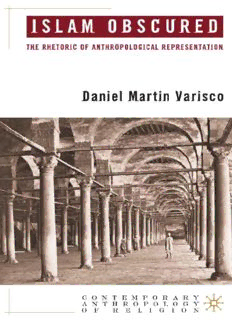
Islam Obscured: The Rhetoric of Anthropological Representation PDF
Preview Islam Obscured: The Rhetoric of Anthropological Representation
ISLAM OBSCURED CONTEMPORARY ANTHROPOLOGY OF RELIGION A series published with the Society for the Anthropology of Religion Robert Hefner, Series Editor Boston University Published by Palgrave Macmillan Body / Meaning / Healing By Thomas J. Csordas The Weight of the Past: Living with History in Mahajanga, Madagascar By Michael Lambek After the Rescue: Jewish Identity and Community in Contemporary Denmark By Andrew Buckser Empowering the Past, Confronting the Future By Andrew Strathern and Pamela J. Stewart Islam Obscured The Rhetoric of Anthropological Representation Daniel Martin Varisco ISLAMOBSCURED © Daniel Varisco,2005. Softcover reprint of the hardcover 1st edition 2005 978-1-4039-6772-5 All rights reserved.No part of this book may be used or reproduced in any manner whatsoever without written permission except in the case of brief quotations embodied in critical articles or reviews. First published in 2005 by PALGRAVE MACMILLAN™ 175 Fifth Avenue,New York,N.Y.10010 and Houndmills,Basingstoke,Hampshire,England RG21 6XS Companies and representatives throughout the world. PALGRAVE MACMILLAN is the global academic imprint of the Palgrave Macmillan division of St.Martin’s Press,LLC and of Palgrave Macmillan Ltd. Macmillan® is a registered trademark in the United States,United Kingdom and other countries.Palgrave is a registered trademark in the European Union and other countries. ISBN 978-1-4039-6773-2 ISBN 978-1-4039-7342-9 (eBook) DOI 10.1057/9781403973429 Library of Congress Cataloging-in-Publication Data Varisco,Daniel Martin. Islam obscured :the rhetoric of anthropological representation / Daniel Martin Varisco. p.cm.—(Contemporary anthropology of religion) Includes bibliographical references (p.) and index. ISBN 978-1-4039-6773-2 (pbk.:alk.paper) 1.Islam.2.Ethnology—Islamic countries.3.Islam and culture— Islamic countries.I.Title.II.Series. BP161.3.V37 2005 306.6(cid:2)97—dc22 2004050514 A catalogue record for this book is available from the British Library. Design by Newgen Imaging Systems (P) Ltd.,Chennai,India. First edition:January 2005 10 9 8 7 6 5 4 3 2 1 The Muslim should learn to look more objectively at his religious history, particularly at how Islam has fared at his hands, and the non-Muslim should learn to know something of what Islam does to a Muslim from the inside. Fazlur Rahman The anthropologist taking a phenomenological approach focuses on the daily lived experience of the local islams and leaves the study of theological interpretation to the Islamists. Abdul Hamid el-Zein This page intentionally left blank Contents Acknowledgments ix Introduction Anthropology and Islam 1 Chapter 1 Clifford Geertz: Islam Observed Again 21 Chapter 2 Ernest Gellner: Idealized to a Fault 53 Chapter 3 Beyond the Veil: At Play in the Bed of the Prophet 81 Chapter 4 Akbar Ahmed: Discovering Islam Inside Out 115 Epilogue Muslims Observed: The Lessons From Anthropology 135 Notes 163 Bibliography 199 Index 221 This page intentionally left blank Acknowledgments T his book has evolved over several years of deciding what it should be. Along the way a number of colleagues have patiently responded to my incessant emails and, at times, graciously given of their time to read drafts of chapters in the book. Among these are Najwa Adra, Jon Anderson, Dale Eickelman, Steve Caton, Andre Gingrich, Terry Godlove, Bob Hefner, David Hicks, Sharryn Kasmir, Kathy Kueny, Ron Lukens-Bull, Rich Martin, Laury Silvers, Ira Singer, Richard Tapper, Shelagh Weir, and Bill Young. Many Muslim friends and stu- dents have helped shape my thinking for this book in ways they would probably not recognize. After finishing the draft of this book, I received news of the pass- ing of George Makdisi, a distinguished historian who had served on my doctoral committee at the University of Pennsylvania. Over the years he was a mentor to me on matters philological and pragmatic. Although this book does not touch on the subjects of Islamic law and education to which he made notable contributions, I do owe part of my abiding penchant for critical engagement to the demanding stan- dards Makdisi set for himself as well as for his students. Mindful of his influence, which never allows me to be comfortable with established thinking, I dedicate this book to George Makdisi, an individual who, in my mind, defines what it means to be a scholar and a gentleman. The chapter on Geertz was given in roughly its present form at the annual meeting of the Society for the Anthropology of Religion in Cleveland, Ohio, in April, 2002. The chapter on Mernissi stems from a paper delivered at the American Anthropological Association in Washington, D.C., 1995. I delivered the chapter on Ahmed at the annual meeting of the Society for the Anthropology of Religion in Providence, Rhode Island, in April, 2003. I wish to thank Yale University Press for permission to quote from Geertz’s Islam Obscured.
Description: